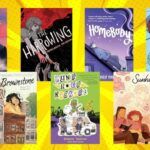
Take One Step This Week Toward Combating Censorship: This Week’s Book Censorship News, February 25, 2022
If you’re fired up about book challenges and want to do one actionable thing about it that requires little more than a few minutes of time, this one’s for you.
One of the several possible ways to fight book challenges is being tuned into your local school and library boards. School boards tend to be elected offices, while public library boards can either be elected or can be appointed. In the case of elections, you, as a voter and citizen of your community, can not only choose to endorse a candidate who cares about intellectual freedom, but you can run for those positions yourself. If your board utilizes the appointment system, you can submit an application for open positions.
While running for and sitting in those positions can take a lot of time, voting for those positions is part of civic duty.
Here’s your action step this week: look up your local school and public library board. Who is sitting on it? How did they get there — was it election or appointment? How long is their term? When do elections for open positions happen? It’s likely a board seat on either may be up for spring elections in April or May this year, and/or there may be open positions during the fall election season in October or November.
If you find there are open positions coming up for election, research the candidates. What language do they use to talk about how they see themselves in the role? By now, you’re likely conscious of some critical words that define those seeking to censor educators and the materials they use or have available in schools and libraries (look for words such as “parental rights” or “oversight,” among others).
It might feel like a small step, but many small steps taken add up. The more information you know about your own community, the more you’re able to be an active participant in it. The death of local news has been a tremendous detriment to so many towns, and where information used to be readily shared through those sources has fallen instead to partisan-aligned social media outlets. We’re all much more responsible for our own civic education in the wake of it.
The only way the war against intellectual freedom is going to be won is by being armed with information that allows you to understand the responsibility and the power in using your voice at the poll, in the community, and at or on these local boards.
A favor to ask before diving into the roundup for the week. Once you’ve done this work and looked up your school and library boards and the policies around them, can you share that information? This handy form is anonymous but will help compile a resource for people across the country to be better informed. Bonus: you can use it as your personal template for this research — send yourself a copy of the form for your own records.
Book Censorship News: February 25, 2022
- The Oklahoma Attorney General is investigating 50 books, primarily YA, and whether or not they violate state obscenity laws.
- Lafayette Parish Library in Louisiana was subject to board overreach almost exactly a year ago. Now they’ve expanded their right-wing board stacking and removed more power from library workers in developing the collection. At the latest meeting, they had an LGBTQ+ rights advocate arrested.
- 75 books are under fire in Cherokee County, Georgia. As of writing, the list of titles hasn’t been revealed, nor is the board meeting available for public viewing.
- All of the books challenged at Hamilton East Public Library in Indiana were retained in the collection, though one had been misshelved and was returned to its appropriate area.
- Franklin Strong talks about the books under discussion in a Moms For Liberty Facebook group and the efforts they’re taking to create disruption for the Eanes Independent School District in Texas. Know this is happening in many of these Facebook groups and that some Moms organizations have dedicated subcommittees to do this research, compilation, and challenging.
- A Nebraska education board member talks about how books are “hypersexualizing” children. Note this board member is anti-CRT and was appointed by the state governor, who has financial ties to the Family Research Council.
- The NAACP is helping with the challenge of Dear Martin in Haywood County Schools in North Carolina.
- Gender Queer will not be removed from Crested Butte Public Library in Colorado.
- What’s going on in Forsyth County, Georgia, has been challenging to track down. This story gives some insight into the board deciding to look at a number of books after parental complaints.
- Bixby Public Schools in Oklahoma will retain Thirteen Reasons Why and Me and Earl and The Dying Girl in their libraries.
- The Hate U Give is being challenged in Monte Vista, Colorado.
- No decision has been made yet on the books being reviewed in Yorktown Central School District in New York.
- Auburn School District in New York has developed its committee to review the challenged All Boys Aren’t Blue.
- Williamson County in Tennessee removed Walk Two Moons from their curriculum but will be retaining several other challenged titles.
- Board meetings at the Pella Public Library in Iowa have included several regular complaints about Gender Queer and about how the library gets its funding from ALA (it…does not, nor does any library). They’re trying to find a solution.
- To Kill a Mockingbird will stay on shelves in Columbia County, Georgia schools.
- North Smithfield, Rhode Island, parents are challenging a number of queer titles in the school district. There are a number of non-queer focused titles among them, too, including Beloved and Sloppy Firsts.
- Gender Queer and This Book is Gay will stay on shelves in Waltham, Massachusetts, schools.
- Chasing Lincoln’s Killer, a nonfiction account of the assassination of Abraham Lincoln, is being challenged in North Marshall Middle School in Kentucky because among depictions of how brutal the assassination was, “a photo in the book that showed the devil whispering into John Wilkes Booth’s ear.”
- The Bluest Eye was a supplemental reading option in Berkeley County School English classes in West Virginia, but now it’s been pulled after complaints.
- At a Scholastic Book Fair in Hastings, Minnesota, two board members took it upon themselves to remove titles from the sale that they deemed inappropriate to be displayed. They were still available but parents needed to be present for children to purchase those titles. That’s still censorship.
- Round of applause for this group of high schoolers at North Kansas City High School for showing up to the board meeting and defending your rights to read. You shouldn’t need to do this.
Further Reading
Want to do something for the authors and books being challenged that doesn’t cost money and doesn’t require you to leave your couch? This set of recommended actions is great, and it acknowledges the inherent privilege in the idea buying books is the solution.
Also In This Story Stream
- Sexual Assault Awareness Month & Book Banning: Book Censorship News, April 5, 2024
- How Public Libraries Are Targeted Right Now—It’s Not “Just” Books: Book Censorship News, March 29, 2024
- The 2024 Lambda Literary Awards Shortlists Are Here
- You’re Wrong About These Common Myths About Book Ban: Book Censorship News, March 22, 2024
- State Anti-Book Ban Legislation Updates: Book Censorship News, March 15, 2024
- They’re Dismantling Higher Education, Too: Book Censorship News, March 8, 2024
- The Landmine of Common Sense Media: Book Censorship News, March 1, 2024
- What Updates Should Library Collection Policies Include?: Book Censorship News, February 23, 2024
- Targeting Demographic Data to Skew Reality: Book Censorship News, February 16, 2024
- Why Do We Even Read?: Book Censorship News, February 9, 2024













